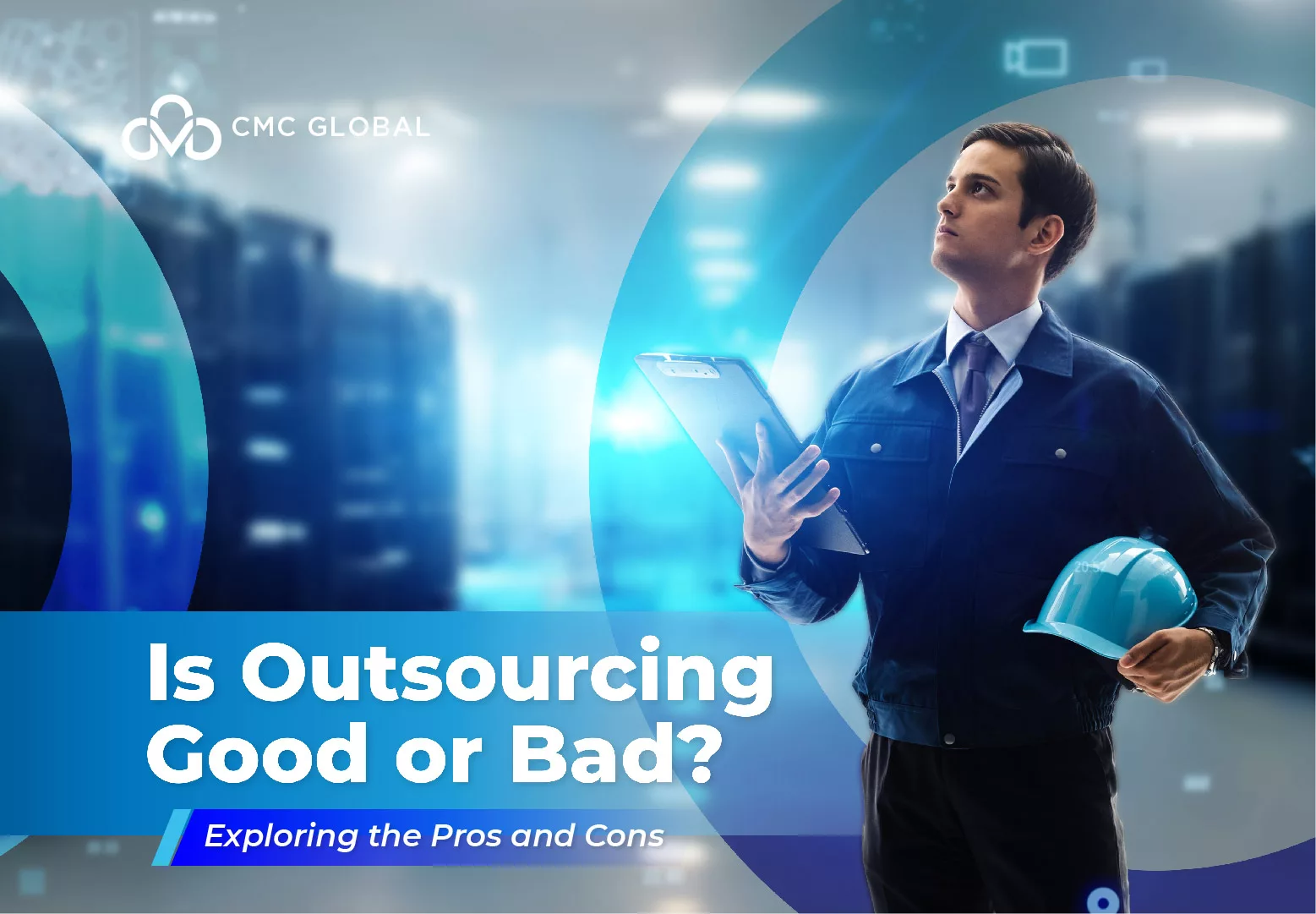Outsourcing is a hotly debated topic in today’s globalized business landscape. Some hail it as a cost-saving, efficiency-boosting strategy, while others see it as a threat to jobs and local economies. So, is outsourcing good or bad? Let’s dive into this contentious issue and explore its advantages, disadvantages, and the impact it has on businesses and economies worldwide.
What Is Outsourcing?

Outsourcing is the practice of contracting out certain business functions or processes to third-party service providers, for certain duties, freeing up the company to focus on its core businesses. These functions can range from customer support and IT services to manufacturing and data entry. Outsourcing is a strategic decision that can have far-reaching consequences for an organization.
The Advantages of Outsourcing
Outsourcing can be a smart and cost-effective way to grow your business and achieve your goals. Here are three benefits of outsourcing that you should consider:
1. You Don’t Have To Hire More Employees
When you outsource, you can pay your help as a contractor. This allows you to avoid bringing an employee into the company, which saves you money on everything from benefits to training.
2. Access To A Larger Talent Pool
Outsourcing can help you find the best talent for your business. Sometimes, the local market does not have enough qualified candidates. You may have to settle for less than ideal employees. By looking for talent in other regions or countries, you can access a wider and more diverse pool of professionals. Outsourcing can be a smart solution if you need specialized skills or expertise.
3. Lower labor costs

Outsourcing certain functions to other companies can help your business reduce its labor costs. The third-party organization takes care of hiring, paying, training and providing benefits to the employees who perform the tasks. This way, your company can concentrate its labor costs on your core staff. Outsourcing can also help you save on equipment costs. It may be cheaper to hire a outside of your organization than to purchase new equipment, relocate or change processes.
4. Focus on Core Activities
Outsourcing non-core functions allows businesses to concentrate on their core competencies and strategic objectives. This enhanced focus can lead to innovation and improved competitiveness.
The Disadvantages of Outsourcing
Despite the many benefits of outsourcing, you don’t want to go down this path until you compare these to the potential drawbacks:
1. Loss of control
Outsourcing can help you achieve your goals, but it also means giving up some control over the work.
This is because you are usually hiring a contractor, not an employee. And since the contractor is working remotely, it can be hard to monitor and manage the work as you wish.
2. Communication issues
Differences in time zones, languages, and cultural nuances can lead to miscommunication and misunderstandings between businesses and their outsourcing partners.
Read more: Surviving Time Zone Differences When Outsourcing to Vietnam
3. Quality Control
Outsourcing can have many advantages, but only if the quality of the work meets your expectations. Otherwise, you will be dissatisfied.
You can outsource certain tasks successfully, but you have to agree on the quality standards beforehand.
4. Security and Privacy Risks
Outsourcing often involves sharing sensitive data with external parties, which can pose security and privacy risks if not managed properly. Consider reviewing data agreements and ensuring any tools you have are compatible with the other company’s to minimize any risks
Is Outsourcing Good or Bad for Jobs and the Economy?
Job Impact
The impact of outsourcing on jobs is a point of contention. While it can lead to job displacement in some sectors, it also creates job opportunities in others. Outsourcing can help businesses lower costs, which, in turn, can lead to lower prices for consumers and increased demand, potentially spurring job creation.
Economic Impact
On a broader scale, outsourcing can stimulate economic growth by enabling businesses to be more competitive and efficient. However, it can also contribute to income inequality and have adverse effects on local economies when entire industries are outsourced.
How to determine if outsourcing is right for your business
Here is how to determine if outsourcing is a good fit for your business:
1. Determine your company’s core functions
To begin the decision-making process, you should identify your company’s core products and services. Then, you should evaluate your company’s operations and find out which areas need more efficiency. This will help you determine which business functions can be outsourced to reduce your focus and costs.
2. Calculate department costs
Outsourcing can help you reduce costs and focus on your core functions. To decide which departments to outsource, you need to evaluate their performance, revenue and turnover. Then, you can identify the non-essential departments that are affecting your profits and compare your costs with outsourcing options. This can help you find the best outsourcing solution for your business.
3. Research companies
To outsource some tasks effectively, you need to identify which functions and departments can benefit from it. Then, you can look for reputable companies that offer those services and compare their prices and quality. You should also check their hiring, security and contract policies, especially the consequences of not meeting the standards. Additionally, you can ask your contacts and industry peers for referrals and feedback.
4. Prioritize your needs
To find the best outsourcing partners for your business, you need to do some research on the market. For instance, if you want to outsource customer support, you should think about:
– The availability of the contractor during your business hours
– The communication channels that your customers prefer to use
– The volume of support requests that the contractor can handle
– The frequency and format of the reports that the contractor will provide
– The security measures that the contractor will follow to protect your customers’ sensitive data
You can use this analysis to estimate the cost and benefit of outsourcing the business process. Alternatively, you can use this information to improve the efficiency and productivity of your in-house department.
5. Determine how outsourcing may affect your employees
Outsourcing can have financial benefits, but it can also impact how your employees feel. To assess their reactions, you can use surveys and interviews. Transparency and communication are key to help your employees cope with the change. You should also think about what options you will provide for those who may lose their jobs due to outsourcing.
What Does It Mean to Outsource Your IT Department?
IT Outsourcing services are a way of delegating an organization’s IT needs to an external company. A Managed Service Provider (MSP) can handle various tasks, such as network security, operating system implementation, software installation, and file backup.
IT Outsourcing services are different from break/fix solutions, where technicians are only called in when there is a problem. Break/fix solutions may seem cheaper at first, but they can be more expensive in the long run as the technicians have less incentive to work fast or provide lasting solutions.
A managed IT service provider works with your organization and monitors your network for a monthly fee. They aim to prevent any issues from happening, but they can also provide quick and reliable solutions if anything goes wrong. This means less hassle for them and more cost-effectiveness for you.
IT Outsourcing services are especially beneficial for small to mid-sized businesses, as building an in-house IT department can be costly and time-consuming.

IT Outsourcing is a growing trend that offers many benefits for businesses. It allows them to access specialized skills and expertise, reduce costs and risks, and focus on their core competencies. According to industry analysts, the outsourcing market is expected to grow by 8% annually, and by 2028 it will be larger than the corporate labor market. If you are thinking of outsourcing some of your business functions, you can find many qualified professionals who can help you achieve your goals.
Read more: IT Outsourcing: What It Is and Benefits of IT Outsourcing to Your Business
When Do You Need to Outsource Your IT Department?
If you are in any of these situations, you might want to consider outsourcing your IT services:
– You see that your internal IT department employees lack the skills, knowledge and expertise to cope with the tasks.
– You need to lower the expenses and save the company money spent.
– You need to focus on critical business processes instead of managing your internal team.
– When you face numerous challenges due to rapid business growth.
– When you have to dedicate more time to admin tasks.
Outsourcing your IT services can help you achieve better results, reduce costs, improve efficiency and free up your time for more strategic tasks.
Read more: Comparison: Inhouse Software Development vs Outsourcing
Why do you need to outsource your IT department?
If you want to have an IT department in your business, you might face some challenges. You need to invest a lot of money and resources to manage your financial systems and data. You also need to hire staff to maintain your IT infrastructure. This can be too costly for small and medium-sized businesses. Instead of setting up an IT department internally, you might want to outsource it to a professional IT company.

Some benefits of outsourcing your IT department are:
– You can control your IT expenses better;
– You can save money on your in-house IT costs;
– You can protect your business from cyber threats;
– You can stay updated on the latest technologies and trends with the help of IT experts;
– You can have 24/7 support and maintenance for your IT systems;
– You can let your team focus on their core competencies.
Read more:
- Different Types of IT Outsourcing: Offshore, Nearshore, or Onshore?
- IT Outsourcing: What It Is and Benefits of IT Outsourcing to Your Business
How to pick the best IT Outsourcing company for your business
While looking for an IT Outsourcing vendor, it is crucial to concentrate on achieving your business goals through proven procedures and scalable solutions.
It can be challenging to research possible managed IT support companies. Consider utilizing this checklist as a useful starting point to simplify the search process.
- Does the vendor have a good record of offering IT solutions?
- Does the vendor employ a group of highly qualified and experienced IT professionals?
- Can the vendor get good feedback from previous projects?
- Can the vendor support your company on-site if necessary?
Your IT problems are resolved by proactive outsourced IT solutions from CMC Global, which detect and fix issues before they happen.
CMC Global offers customized IT solutions to make the process of supporting your company’s IT easier:
- Provide and maintain IT infrastructure
- Promote business expansion
- Use solutions for mobile, cloud, and video conferencing
- Use cutting-edge, modern technologies.
Hundreds of international businesses have used CMC Global’s IT outsourcing service since 2017. As one of Vietnam’s largest IT outsourcing vendors, CMC Global’s IT solutions, communication tools, and technology is scalable and future-proof.

Read more: 8 Reasons Why You Can Rely On CMC Global For Your Next Software Project
Contact us to learn how hiring CMC Global to handle your IT outsourcing can boost productivity and give your company the advantage it’s been looking for.
Final Words
So, is outsourcing good or bad? There’s no one-size-fits-all answer. Whether outsourcing is beneficial or detrimental depends on various factors, including the nature of the business, the quality of outsourcing partners, and the broader economic context.
In practice, successful outsourcing requires careful planning, rigorous vendor selection, and ongoing management. When executed strategically, outsourcing can offer significant advantages, allowing businesses to thrive in an increasingly interconnected world.
It’s essential for businesses to weigh the pros and cons, consider the potential impact on jobs and economies, and make informed decisions based on their unique circumstances and goals. Ultimately, the question of whether outsourcing is good or bad depends on how well it aligns with a company’s vision and values.




